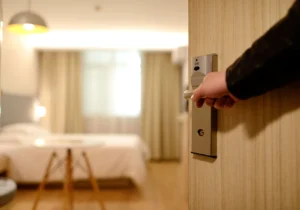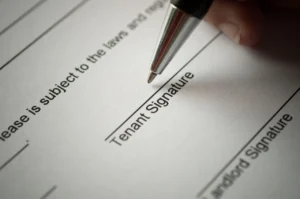10 Important Tenant Screening Questions To Ask
 When considering potential rental applicants, one of the best ways to start navigating through the pile is by asking them tenant screening questions. Although it may be tempting to trust your first impression of a prospective renter, asking background — and potentially tough — questions can help distinguish between a good and bad tenant.
When considering potential rental applicants, one of the best ways to start navigating through the pile is by asking them tenant screening questions. Although it may be tempting to trust your first impression of a prospective renter, asking background — and potentially tough — questions can help distinguish between a good and bad tenant.
The fact is while a charismatic tenant might be desirable, it isn’t as important as a reliable one that pays rent on time and respects your property. By utilizing the proper tenant screening methods, you may be able to avoid future problems and headaches by performing the proper pre-screening process.
Asking tenant screening questions is very similar to interviewing candidates for a job. High-quality questions will help you determine who will make the best tenants for your property.
In fact, pre-screening questions for renters help you determine why the renter is moving, what potential problems you may encounter and whether or not the tenant is qualified to rent from you.
Consider taking advantage of the benefits offered by a tenant screening service, and remember to follow Fair Housing Act laws by holding all applicants to the same set of standards.
Here are some tenant interview questions that you can ask early in the process — even over the phone — to determine whether or not someone is a good candidate:
Please note: These questions do not serve as a fully comprehensive guide to tenant screening. While these questions are a useful starting point in the tenant pre-screening process, they do not replace the tenant screening process as a whole.
Learning about applicants before the tenant screening process
Before any landlord or property manager begins the rental screening process, it’s essential that they take a few pre-screening steps to separate quality tenants from the rest.
First, detail your tenant screening process and leasing requirements in your rental listing. Creating a detailed rental listing can deter applicants that won’t want to provide the information you require to find an ideal tenant. This includes whether you allow pets, smoking and any background and rental checks that will be performed. This enables applicants to pull themselves out of the running before they waste any valuable screening time.
Now that you have a more qualified pool of rental applicants, you can begin asking your prospective tenants more about themselves. However, always check against local, state and national rent laws to guarantee that you’re following juridical regulations. When creating your own list of tenant screening questions and requirements, remember to abide by the Fair Housing Act, which protects renters from discrimination.
General questions to ask a potential tenant
When building your own tenant screening questions list, it’s best practice to start out with general items that you want to know as a landlord. This can include the reasons that attracted the tenant to your rental property and more about their character and situation. Below are example tenant screening questions to incorporate in your list as a landlord:
What are your reasons for moving?
Understanding why a tenant is moving is a straightforward question to ask as a landlord — and it shares a lot about the tenant. Although simple, it can reveal important information, such as if the tenant has had past rental issues. These can include relationship struggles between the tenant and current/past landlords, neighbor disputes or even past evictions. If they are looking for a new place because of landlord problems or an eviction, you need to be careful. If they complain about their current landlord, be wary.
Yet, it could also just highlight benign reasons, such as wanting a larger property, a new neighborhood or shorter commute.
Asking this question can be helpful to the tenant if they would like to provide their own explanations for their recent rental history. This allows the landlord to gain a better understanding of who the tenant is and how they perceive their rental history.
Reminder: Don’t automatically assume the applicant’s answers tell the full story or whole truth. If given consent, reach out to their current and/or past landlord(s) to verify their answers.
What is your ideal move-in date?
The tenant’s answer to this question can quickly decide whether they’re able to rent your property or not. If their ideal move-in date is ASAP, but your property isn’t available for the next few months, it’s best to let the applicant know immediately.
On the other hand, this may show that the tenant’s ideal timeline aligns with your unit’s vacancy dates perfectly.
How many people are in your household?
As the landlord, you need to know exactly how many adults will be leasing your property, especially as each one will have to be screened. If there are other adults that will want to be moving in, you’ll now know to gather their information and add them to your tenant screening list.
If you believe there are too many people for the size of your property, this will immediately let you know that this person and their household aren’t the right fit for you. You need to limit the number to no more than two people per bedroom. Allowing too many residents could be a violation of your municipality’s fire safety laws — and could put the occupants and other tenants at risk.
What is your household income?
Although this sounds like a personal question, it’s your job as the landlord to get a full financial picture of prospective tenants. This allows you to know whether a potential renter can afford your monthly rent. This can be asked in person or as part of the rental application to help you determine if they can keep up with your rental amount.
Landlord best practice is to make this decision based on the tenant’s rent to income ratio. Industry-standard suggests that no more than 30% of your tenant’s annual income should go toward housing costs. For help determining if a tenant can afford your rent, check out our prorated rent calculator.
If you’re interested in learning more about standard rent to income ratio, read AAOA’s comprehensive guide here.
Do you have any pets?
Make sure any pets the tenants have comply with your pet policy. Chances are tenants are not going to part ways with a furry family member to adhere to the terms of a lease, so this can help eliminate those that can’t follow your pet policy.
Are you a smoker?
Landlords should always ask this question because smoke can cause extreme property damage, which would be a headache to fix in the future. With this question, the landlord should emphasize the property’s smoking policy and potential consequences for tenants who break the lease agreement.
Even if the tenant doesn’t disclose whether they smoke, it’s still important to ask.
Questions to ask about a tenant’s background
A great reflection of whether a prospective tenant will be a good fit for your property can be found within their rental, financial and legal history. This information can be explored through a tenant credit check, tenant background check, rental history and criminal history report.
However, before you pull these reports, you can also choose to ask the tenant about their rental background. This may provide a larger context to past situations or give you an idea of the tenant’s overall character.
Below are some example tenant background questions:
What is your rental history like?
By asking this question, a landlord can learn more about the applicant’s experience as a renter — or lack thereof. If they’ve moved around a lot or stayed in one location for many years, it can also give you an idea about their likelihood to remain a short-term or long-term potential tenant.
Meanwhile, the applicant may also choose to reveal other details like if they have broken a past rental agreement to end a lease early. On paper, this information may appear as a red flag, but this can also give the tenant an opportunity to explain the situation. If the lease was broken due to unforeseen external circumstances, such as neighborhood construction, the applicant may still be a good tenant option. However, just make sure to check with their previous landlord, if authorized, to verify the reason.
Do you consent to a credit check?
Tenant credit checks and tenant background checks must be part of your tenant application process, but you need to get informed consent to administer these checks. If a would-be tenant is not willing to provide this consent, look elsewhere. This is one of the most important questions to ask when pre-screening tenants.
Be sure to include this information and get written approval from the tenant in the official rental application form. Some of the tenant screening services provided by AAOA automatically obtain this authorization from the tenant.
Have you ever been served an eviction notice?
Ideally, this would be one of the tenant pre-screening questions to ask previous landlords, but that’s not always possible. Don’t hesitate to ask this important question of would-be tenants, but know that you may not get a straight answer — especially if they have something to hide.
If they say “yes,” asking will give them the chance to explain. People sometimes have experienced a job loss or other difficult financial situation that they have since rectified, and this question gives them the opportunity to tell you those details.
Do you have a criminal record?
A criminal history report only shows convictions within the last seven years and doesn’t include arrests. By asking your tenant about their criminal record, you may be able to glean more information about them.
Important note: Many states and cities have passed laws that prevent landlords from being able to ask about criminal history when first evaluating an applicant. Always check with local and state legislation before asking this question. Some do not allow landlords to run criminal background checks as part of the rental screening process.
Asking questions before the tenant screening process
Asking tenant screening questions is an essential part of renting out property. Whether it’s by phone or in-person, speaking with potential tenants provides landlords with the opportunity to paint a fuller picture of the person that might be living in their property.
Just as it’s important to ask the previously mentioned questions, it’s equally critical that landlords avoid questions that may be used to discriminate against potential tenants. Under the Fair Housing Act, it’s illegal for landlords to refuse tenants based on the following protected classes:
- Race
- Ethnicity
- Religion
- National origin
- Sex
- Physical disability
- Mental disability
- Familial status
For legal and ethical purposes, avoid any questions that touch upon these subjects and that may be construed as discriminatory.
For more information about tenant screening criteria and questions, check out AAOA’s tenant screening checklist.
Optimize your tenant screening process with AAOA today
At American Apartment Owners Association, our members have access to a large collection of resources, from tenant screening and tenant background checks to important landlord forms and educational resources.
This information is not meant to substitute for legal advice. If you have issues or questions regarding tenant screening questions for applicants, it is recommended that you seek the advice of an attorney. Many local and state bar associations have referral services that can assist you in locating an attorney, or you can find one here.













 Accessibility
Accessibility